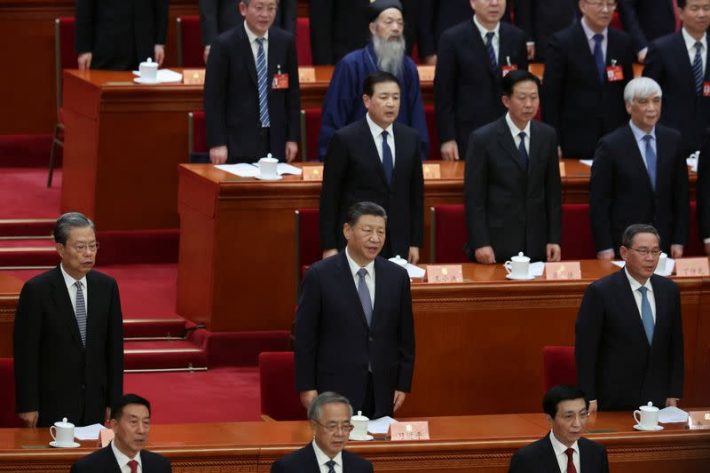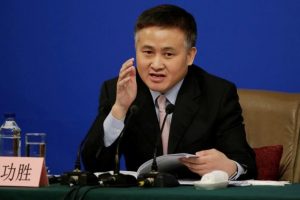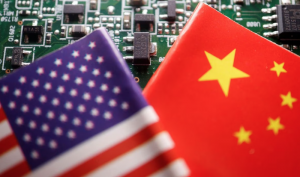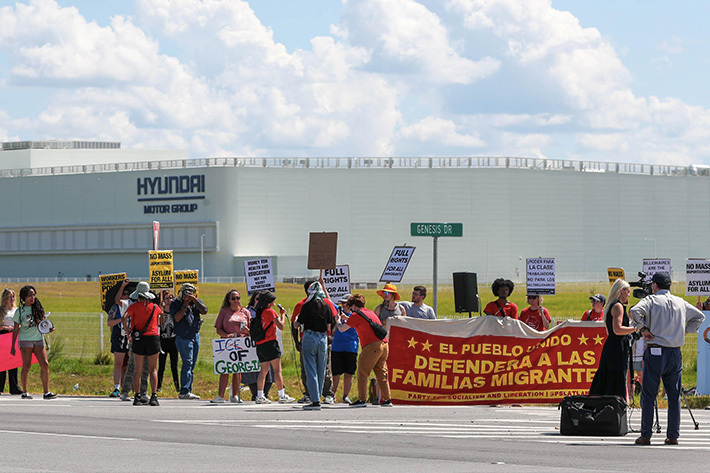China’s top lawmakers are due to gather in Beijing to discuss a range of issues from November 4-8, including the outcome of the US election.
Analysts say the overlap with voting on Tuesday November 5 to decide the party and next president who will take office after the Biden Administration ends in January is no coincidence, given the threat of major tariff increases, a trade war and geopolitical instability could emerge from the result.
They say that even if Donald Trump, the Republican candidate, loses his bid for re-election, the threat of possible unrest could lead to economic repercussions for countries in Asia.
ALSO SEE: US-China Tech War Seen Continuing Under Trump or Harris
The date of the National People’s Congress (NPC) Standing Committee meeting was announced on Friday by state news agency Xinhua, however no mention was made on a raft of fiscal measures aimed at reinvigorating the country’s sputtering economy, which have not been listed on the agenda yet.
Lawmakers at the NPC meeting are set to deliberate on mineral resources, energy, anti-money laundering legislation, maritime issues and other areas, Xinhua reported.
The outcome of the US presidential election will be a key focus, according to the South China Morning Post, which said the meeting is seen as a strategic response to potential geopolitical developments.
“The timing suggests that Chinese policymakers aim to manage any fallout from the US election and provide updates on the country’s economic stimulus efforts,” it said.
Concern over ‘unpredictable’ Trump
Analysts have said for weeks that Beijing has kept its powder dry, opting not to make big economic decisions until it knows the outcome of the US election.
The Wall Street Journal’s Lingling Wei said in a mailout on Tuesday that “China’s leadership certainly has indicated what it wants from the next American leader: predictability and a willingness to soften Washington’s tough-on-China stance.”
Trump unpredictability was a problem for the Chinese during his time in office, when Washington launched a trade war against Beijing. “Xi and his team found it utterly exhausting having to deal with an erratic dealmaker using extreme pressure to extract concessions,” she said.
“The prospect of Trade War 2.0 under a second Trump administration, at a time of considerable economic stress in China, is keeping at least some people up at night in Beijing.”
If Kamala Harris wins, she is expected to largely inherit Biden’s approach to China – “tough but also more targeted.”
But if Trump wins and hikes tariffs on products from China, as he has threatened, it could shave 2.5 percentage points off China’s gross domestic product growth over the subsequent 12-month period, she said.
That would raise costs considerably in the US.
And if it happened, “Beijing would likely hit back,” she said, potentially leading to cycles of retaliation.
To mitigate the impact, Beijing would have to step up fiscal stimulus — something it had been less willing to do despite its recent economic vows of support, then allow plenty of credit, and perhaps devalue the currency, she said.
Some decisions hinge on poll outcome
Meanwhile, matters related to the appointment and removals of officials are also on the schedule, as well as an examination of the State Council’s financial work report, the management of state-owned assets and a special report on the administrative tasks of state-backed assets last year, Xinhua added.
However, the report did not mention if there would be discussion on potential moves to increase government debt, bolster consumers, and support China’s faltering real estate market – all of which were flagged as possible measures by Finance Minister Lan Foan earlier in October.
China has rolled out a series of measures in recent weeks designed to help the economy reach Beijing’s stated 5% growth target for 2024.
However, many analysts have argued that even more aid is needed to boost growth, and have called on Chinese officials to reveal details on the size and timing of such measures.
A report last week from Caixin Global suggested that China may raise 6 trillion yuan from the issuance of special treasury bonds over the next three years, although the number did not spark a upturn in sentiment in Chinese stocks.
Reuters has reported that Beijing is planning to unveil special sovereign bonds worth around 2 trillion yuan this year. Decisions on such matters are likely to be known in coming weeks.
- Jim Pollard with Reuters
NOTE: The headline on this report was amended on Oct 28, 2024.
ALSO SEE:
China Think Tank Calls For $280bn Fund to Stabilise Stocks
China Reduces Key Lending Rates in Bid to Rev up Economy
China Ramps up Spending on Housing Projects to $562bn
China’s Top Cities Set to Lift All Curbs on Homebuyers
China Set to Issue $284bn in Special Bonds to Lift Economy
























